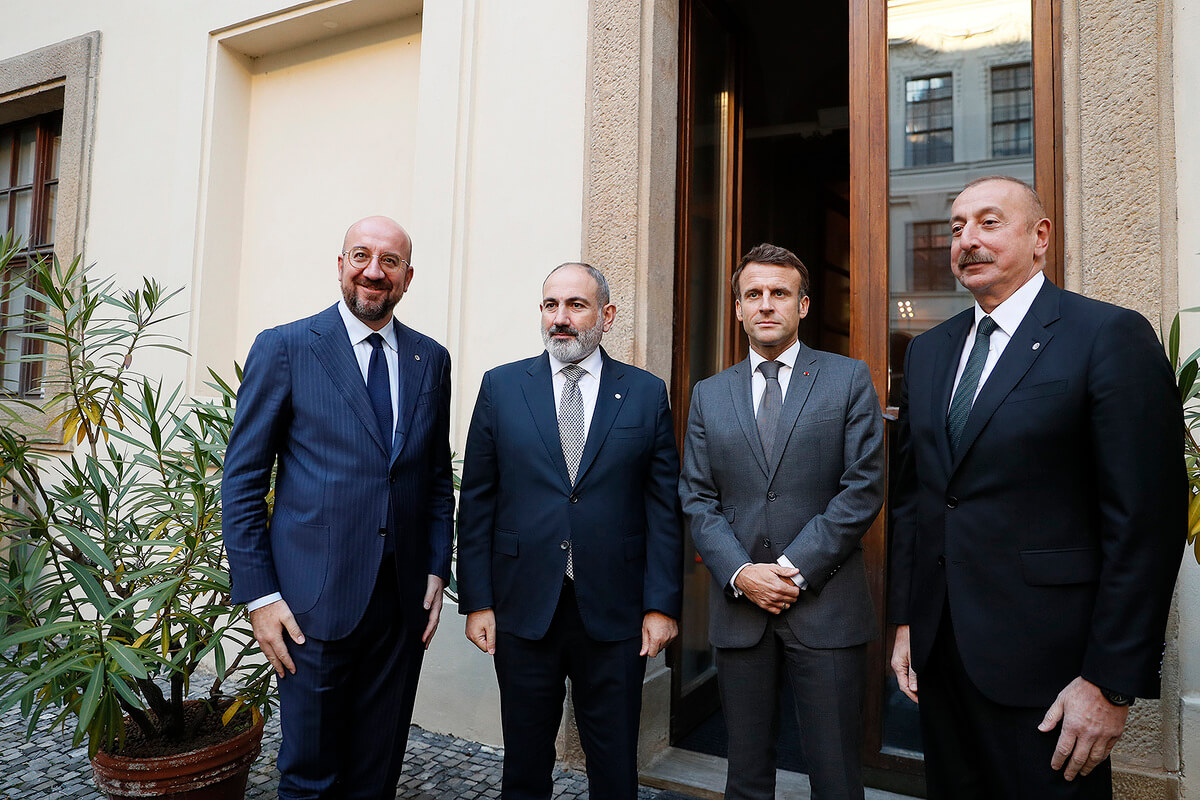Azerbaijani President Ilham Aliyev said on Thursday that Armenia and Azerbaijan are “closer to peace,” noting that both sides are committed to resolving their decades-long dispute over Nagorno-Karabakh.
Aliyev made the remarks while speaking to the press after a meeting with Armenian Prime Minister Nikol Pashinyan, his French counterpart Emmanuel Macron, and European Council President Charles Michel on the sidelines of the first European Political Community summit in Prague. Calling the meeting “another step towards peace,” Aliyev thanks Macron and Michel for facilitating the dialogue. “I believe that this meeting will be of tremendous importance in reaching a peace agreement,” he said.
Tonight, Armenia and Azerbaijan confirmed their commitment to the Charter of the United Nations and the Alma Ata 1991 Declaration through which both recognize each other's territorial integrity and sovereignty.
— Emmanuel Macron (@EmmanuelMacron) October 7, 2022
He revealed that peace talks have “already been kickstarted” and that Armenian and Azerbaijani foreign ministers would hold a meeting soon.
However, while Aliyev said he had a serious discussion with Pashinyan about Nagorno-Karabakh, he blamed Armenia for the latest tensions. He said the biggest threat to Azerbaijan is thousands of landmines planted in Azerbaijani territory by Armenia during the 2020 war. Calling it an “act of terrorism,” Aliyev said, “Armenian terrorism against us continues and must be stopped.”
Met today with @azpresident in Prague after meeting with @NikolPashinyan in New York.
— Charles Michel (@CharlesMichel) October 6, 2022
This afternoon together with @EmmanuelMacron we’ll meet again with 🇦🇿 President and 🇦🇲 Prime Minister on relations between Armenia and Azerbaijan & on advancing sustainable peace in the region. pic.twitter.com/USWeshrPm0
Furthermore, he accused Armenian forces of not withdrawing from Azerbaijan’s sovereign territory. Aliyev also reasserted that Karabakh belongs to Azerbaijan. He claimed that Armenia is not interested in peace and has violated every agreement since the 2020 war. He thus said he hoped that the latest talks would be fruitful. “If Armenia is interested, the peace agreement could be signed by the end of the year,” he proclaimed.
Meanwhile, Pashinyan stated that the two rivals agreed to “recognise each other’s territorial integrity and sovereignty” and use this as a basis for peace negotiations. He further noted that Yerevan and Baku had agreed to support an ‘EU Civilian Mission’ along their volatile border. “The mission will start its work in October, for a maximum period of two months. The purpose of the mission will be to build confidence and, through its reports, support the border commissions,” he said.
In Prague I reconfirmed again our proposal on unblocking of all regional communications. @Azerbaijan again did not respond positively. I reiterate, @Armenia is ready for unblocking of all regional communications with full respect of our sovereignty and legislation.
— Nikol Pashinyan (@NikolPashinyan) October 7, 2022
Pashinyan also tweeted on Friday that he had proposed unblocking all regional communications in the South Caucasus. The two countries closed all regional communication and transportation networks following the outbreak of war in 2020. He stressed that Armenia is “ready for unblocking of all regional communications with full respect of our sovereignty and legislation.” However, Pashinyan said Azerbaijan “did not respond positively” to his proposal.
Despite these differences, Macron and Michel agreed that the talks were productive and pledged France and the EU’s support towards establishing peace in the South Caucasus.
Also interesting that the civilian mission will assist with the work of the two border commissions. In that context, a deployment for only two months is especially intriguing.
— Onnik J. Krikorian (@onewmphoto) October 7, 2022
EU to send 'civilian mission' to Armenia to help mark borders with Azerbaijan https://t.co/Zi7nLRrmRK
The meeting took place against the backdrop another escalation of tensions between Armenia and Azerbaijan. On Sunday, Armenia accused Azerbaijan of committing war crimes after footage surfaced on social media showing Azerbaijani troops executing captured Armenian soldiers. Armenian authorities have demanded an international investigation into the incident and urged the global community to impose sanctions on Azerbaijan for violating international law. Officials also submitted the footage to the European Court of Human Rights (ECHR) and the International Court of Justice (ICJ), urging the bodies to punish Azerbaijan.
The incident is part of ongoing tensions between Armenia and Azerbaijan, which fought a deadly 44-day war in 2020 over the disputed Nagorno-Karabakh region. Peace talks between the two neighbours have mostly failed, and their troops regularly engage in violent confrontations along the volatile border, frequently resulting in several casualties on both sides. The latest round of violence erupted on 12 September and has led to an estimated 221 deaths, with 150 from Armenia and 71 from Azerbaijan.

